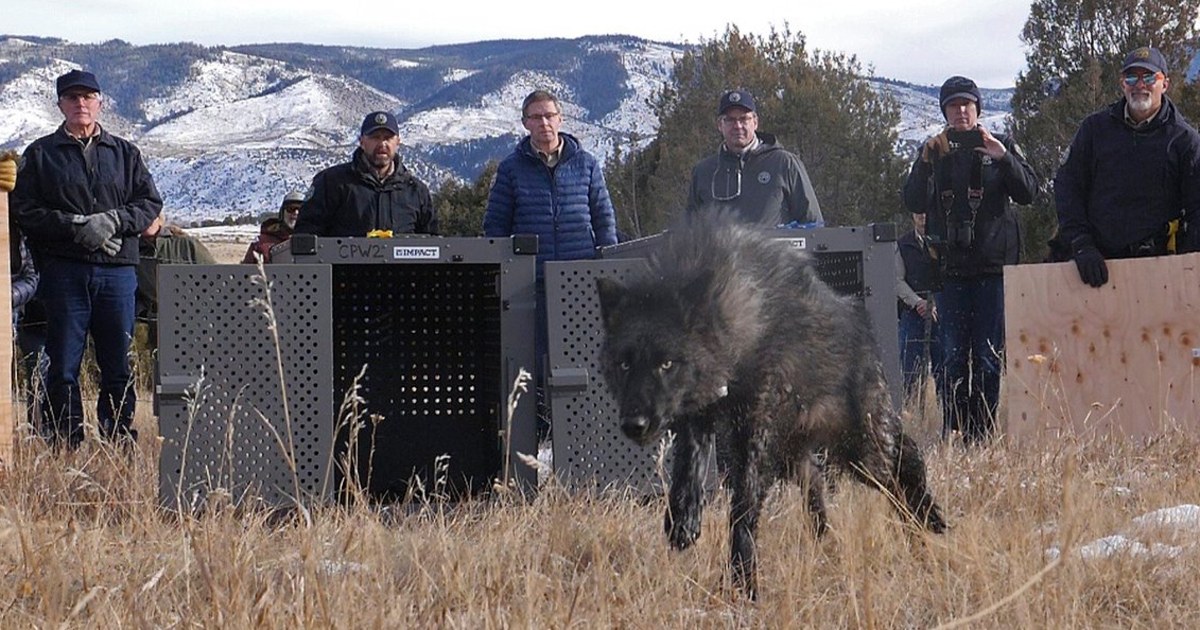Somewhere on a remote mountainside in Colorado’s Rockies, a latch flipped on a crate and a wolf bounded out, heading toward the tree line. Then it stopped short.
For a moment, the young female looked back at its audience of roughly 45 people who stared on in reverential silence. Then she disappeared into the forest.
She was one of five gray wolves wildlife officials released in a remote part of Colorado’s Rocky Mountains on Monday to kick off a voter-approved reintroduction program that was embraced in the state’s mostly Democratic urban corridor but staunchly opposed in conservative rural areas where ranchers worry about attacks on livestock.
…
It marked the start of the most ambitious wolf reintroduction effort in the U.S. in almost three decades and a sharp departure from aggressive efforts by Republican-led states to cull wolf packs. A judge on Friday night had denied a request from the state’s cattle industry for a temporary delay to the release.



There’s risks to choosing to live away from other humans. North America is rampant with large predators: wolves, bears and lions. Humans banned together millennia ago for such protection. If you wish to live a dozen miles from more than 2 other people, that’s a risk you take.
Reintroducing wolves is fixing the mistake we made in killing them all; which is causing more problems than it solved.
Why do you think we killed them all? So people didn’t have to take that risk?
No that’s not really the cause. This is a known thing and reintroduction is common. For example:
https://www.nps.gov/yell/learn/nature/wolf-restoration.htm
TLDR: Cause: “ In the 1800s, westward expansion brought settlers and their livestock into direct contact with native predator and prey species. Much of the wolves’ prey base was destroyed as agriculture flourished. With the prey base removed, wolves began to prey on domestic stock, which resulted in humans eliminating wolves”
Effect of reintroduction: “Preliminary data from studies indicate that wolf recovery will likely lead to greater biodiversity throughout the GYE. Wolves have preyed primarily on elk, and these carcasses have provided food to a wide variety of other animals, especially scavenging species. Wolves are increasingly preying on bison, especially in late winter. However, most bison biomass consumed by wolves is through scavenging bison dying from other natural causes. Grizzly bears have usurped wolf kills almost at will, contrary to predictions and observations from other areas where the two species occur. Wolf kills, then, provide an important resource for bears in low-food years. Aggression toward coyotes initially decreased the number of coyotes inside wolf territories, which may have benefited other smaller predators, rodents, and birds of prey.”
Thanks for sharing this. It’s really interesting!
My problem with this study has always been that it takes place in Yellowstone. A huge area that is super controlled and significantly different from the rest of the country.
I think blindly believing we’ll see the same results everywhere we throw wolves is wishful thinking.
Guess we’ll see how it plays out. As a hunter I’m not thrilled to have more competition for elk and deer, but it’s always been (and should be) predators get first dibs on wildlife. What I want is to see the reintroduction and revitalization of the buffalo. You know how cool it’d be to see giant herds of bison roaming all over the wild?
It’s weird to think that ecologists, biologists, and other scientists who have studied this issue historically as well as other reintroduction efforts are “blindly” believing anything…
Meanwhile elsewhere… https://extension.colostate.edu/topic-areas/people-predators/public-perspectives-on-wolves-and-wolf-reintroduction-8-004/
“ Studies suggest that attitudes towards wolf reintroduction are influenced by individuals’ beliefs about the right for wolves to exist as well as their emotional responses to wolves.”
Great read! Very interesting.
I still think it was silly to have reintroduction of wolves up to a popular vote instead of leaving it up to the professionals. But it happened, I’m curious to see how far their range goes, the ones in WA go all over.